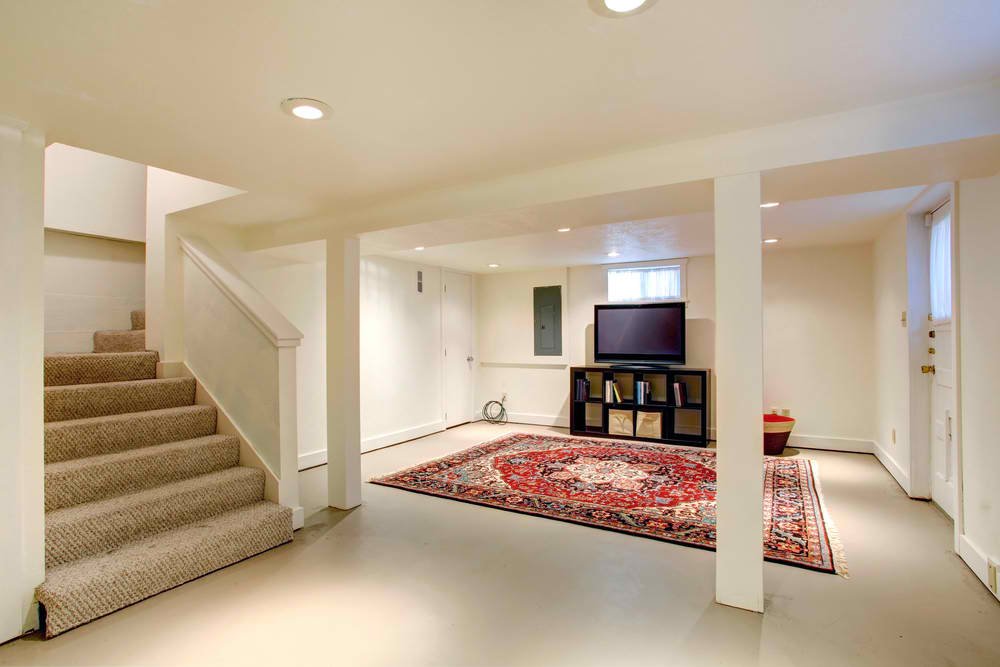Table of Contents
What’s the Best Flooring Option for Your Basement? (Top 5 Picks)
Are you planning to install a new basement floor? There are many quality flooring materials, each of which is geared towards a different part of your house.
But your basement is different from other spaces in your home. Not only is it likely underground but it also tends to experience higher moisture levels. This makes it an unsuitable space to install a popular flooring option such as hardwood.
If you are revamping your basement, consider these options.
What Are the Best Options for Basement Flooring?
Looking good is not enough when it comes to basement flooring. There are a number of factors to consider when it comes to below-grade flooring installations. Let’s have a look at them.
What Is Below Grade Installation?
You may have come across the term ‘below grade’ when buying flooring products. But what does it mean? It does not mean substandard or poor quality. Instead, it identifies flooring that is suited to basements or ground-level installations.
There is a lot of risk involved when it comes to installing flooring below or on ground level. These include groundwater intrusion and water vapour damage. That’s why below-grade flooring needs to be chosen carefully and have certain qualities.
Qualities Needed For Below Grade Flooring Installations
Basement floors need to be prepared for high moisture environments. Here are some qualities they need to possess.
-
They Need to Be Hard
Basement flooring needs to be hard enough to withstand different environments. Porcelain tiles and concrete are durable enough to stand up to high moisture environments. However, if your basement is on the drier side, engineered hardwood and vinyl are options as well.
-
Avoid Organic Material
Natural hardwood flooring may be popular but is the wrong choice for basements. Its organic nature means that exposure to moisture will promote mould and mildew, causing various health issues. That means carpet is also not a good choice for this area.
For the best results choose inorganic flooring materials such as vinyl, porcelain or concrete.
-
Use Raised Subfloors
All below-grade installations require a raised subfloor. This can be a subfloor system or a traditional sleeper system made of plywood.
Having a raised subfloor reduces issues of excess moisture buildup on the floor and helps to prolong the life of the flooring you install.
-
Get Dehumidifying Solutions
One of the biggest challenges when transforming your basement into a liveable space is keeping it moisture-free or as dry as possible. This is why dehumidifying solutions are a good idea.
-
Avoid Multilayer Floors
Most basements have high moisture levels, and installing multi-layer floors will double the drying time. That is why single-layer floors are best for this area.
Now that you know what qualities to look for, here are some options to consider.
Best Basement Flooring Options for Your Home
Each flooring material has pros and cons. Here are some of the best.
-
Luxury Vinyl Flooring
Tough, durable and waterproof, there is hardly anything to hate about these floors. Plus, they are stylish and available in many designs.
Luxury vinyl floors are 100% synthetic, with a UV acrylic coating that prevents sun damage.
Moreover, luxury vinyl floors can be installed quickly and perform very well in high humidity. On the downside, once damaged, they need replacement.
-
Porcelain Tile Flooring
A modern favourite, porcelain tiles are tough and best suited to a moist environment. They require little maintenance and are a durable choice for basements. In fact, porcelain tiles can be installed in every room of your home with ease.
On the downside, the subfloor needs to be strong enough to bear their weight. They also require professional installation for the best results.
-
Sheet Vinyl Flooring
Is budget your main concern? No worries. Sheet vinyl flooring is one of the most budget-friendly flooring options. It is also 100% waterproof, stylish, and ideal for your basement.
They also offer some insulation, which is a blessing compared to usually cold, hard basement floors. On the other hand, they are very difficult to remove and cannot be repaired.
-
Concrete Flooring
This is an affordable and durable option for basement floors. Concrete flooring is moisture-resistant and easy to maintain. Plus you do not need a subfloor.
On the other hand, concrete tends to make basements extremely cold, and the installation process is labour-intensive.
-
Engineered Hardwood Flooring
Do you have a considerably drier basement and want to make this space rentable? Then engineered hardwood is your best option.
It is stable and offers better moisture resistance than its more natural counterparts. Often, it requires a subfloor and is one of the more expensive options. That’s why it is a smart idea to have a realistic budget before shopping for flooring.
Your best basement option is a personal decision. Always consider the purpose behind renovating your basement flooring. How do you intend to use the space? Do you wish to rent it out or turn it into a game room? The next factors you should consider are your budget and personal needs. Basement flooring installation is tricky but can be a rewarding experience if done right. For the best results, it is recommended that you get in touch with professionals with expertise in installing basement floors.













